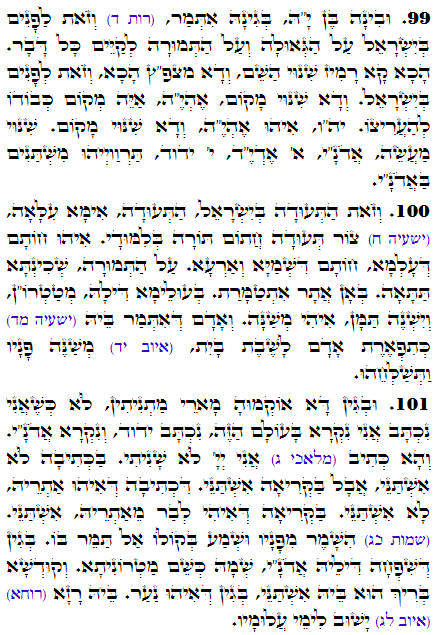Daily Zohar # 2820 – Ki Tetze – Attestation of transformation
Daily Zohar 2820
Daily Zohar 2820

.
Hebrew translation:
100. וְזֹאת הַתְּעוּדָה בְּיִשְׂרָאֵל. הַתְּעוּדָה – אֵם הָעֶלְיוֹנָה, (ישעיה ח) צוֹר תְּעוּדָה חֲתוֹם תּוֹרָה בְּלִמֻּדָי. הוּא חוֹתַם הָעוֹלָם, חוֹתַם הַשָּׁמַיִם וְהָאָרֶץ. עַל הַתְּמוּרָה – שְׁכִינָה תַחְתּוֹנָה. בְּאֵיזֶה מָקוֹם הִתְחַבְּאָה? בָּעֶלֶם שֶׁלָּהּ, מְטַטְרוֹ”ן, וַיְשַׁנֶּהָ, שָׁם הִיא מִשְׁתַּנָּה. וְאָדָם שֶׁנֶּאֱמַר בּוֹ (שם מד) כְּתִפְאֶרֶת אָדָם לָשֶׁבֶת בָּיִת, (איוב יד) מְשַׁנֶּה פָנָיו וַתְּשַׁלְּחֵהוּ.
101. וְלָכֵן פֵּרְשׁוּהָ חַכְמֵי הַמִּשְׁנָה, לֹא כְשֶׁאֲנִי נִכְתָּב אֲנִי נִקְרָא. בָּעוֹלָם הַזֶּה נִכְתָּב יהוה, וְנִקְרָא אֲדֹנָ”י. וַהֲרֵי כָּתוּב (מלאכי ג) אֲנִי ה’ לֹא שָׁנִיתִי. בִּכְתִיבָה לֹא מִשְׁתַּנֶּה, אֲבָל בִּקְרִיאָה מִשְׁתַּנֶּה. שֶׁכְּתִיבָה שֶׁהוּא מְקוֹמוֹ, לֹא מִשְׁתַּנֶּה. בִּקְרִיאָה שֶׁהִיא מִחוּץ לִמְקוֹמוֹ, מִשְׁתַּנֶּה. (שמות כג) הִשָּׁמֶר מִפָּנָיו וּשְׁמַע בְּקֹלוֹ אַל תַּמֵּר בּוֹ. מִשּׁוּם שֶׁשִּׁפְחָה שֶׁלּוֹ אֲדֹנָ”י, שְׁמָהּ כְּשֵׁם הַמַּלְכָּה, וְהַקָּדוֹשׁ בָּרוּךְ הוּא בּוֹ מִשְׁתַּנֶּה, מִשּׁוּם שֶׁהוּא נַעַר. בּוֹ סוֹד (רוּחַ) (איוב לג) יָשׁוּב לִימֵי עֲלוּמָיו.
.
Zohar Ki Tetze
#99
Ruth 4:7
“וְזֹאת לְפָנִים בְּיִשְׂרָאֵל עַל הַגְּאוּלָּה וְעַל הַתְּמוּרָה לְקַיֵּם כָּל דָּבָר שָׁלַף אִישׁ נַעֲלוֹ וְנָתַן לְרֵעֵהוּ וְזֹאת הַתְּעוּדָה בְּיִשְׂרָאֵל”
“Now this was the custom in former times in Israel concerning redeeming (Levirate) and exchanging (releasing): to confirm a transaction, the one drew off his sandal and gave it to the other, and this is the attestation in Israel.”
This verse is related to Binah ‘בינה’ that is constructed from the letters ‘בן’ and ‘יה’, meaning ‘son + YH’. It’s about the continuation of the Light from its source. The ‘redeeming’ in the verse is the aspect of Levirate and the ‘exchanging’ refers to releasing the brother from marrying his brother’s wife but the deeper meaning is about the transformation of light from one level to another.
The Zohar explains that ‘the one drew off his sandal and gave it to the other’ is the aspect of changing/transforming the name. Here its related to transforming the name YHVH יהוה using the form of אתבש (ATBASH
‘this was the custom in former times in Israel’ is the aspect of changing place, which is the holy name אהיה related to Keter. In the Kedusha of Shabbat’s musaf we recite ‘איה מקום כבודו’. The three letters ‘איה’ are from the name of Keter, ‘מקום כבודו’,’his honored place’ to mean that the ‘honor’(Light) of the Holy One Blessed be He comes from Keter. This honor ‘moves’ down to a new place, which is יהו YHV of Zeir Anpin.
The transformation of the name ‘arrives’ to the vessel, Malchut represented by the name אדני ADNY.
#100
‘and this is the attestation in Israel’
Isaiah 8:16
“צוֹר תְּעוּדָה חֲתוֹם תּוֹרָה בְּלִמֻּדָי”
“Bind up the testimony, seal the law among my disciples.”
This verse teaches us that the word ‘attestation‘ is Binah and the ‘seal’ of this world that Zeir Anpin and Malchut.
‘and exchanging’ is the aspect of the Shechina in Malchut, concealed by the archangel Metat-. He transforms her in Malchut to be called ‘Mishna’,’change/double’.
#101
For that reason, the name YHVH is not read as it is written. The letters YHVH in Malchut becomes אדני ADNY. Malachi 3:6
“כִּי אֲנִי יְהוָה לֹא שָׁנִיתִי וְאַתֶּם בְּנֵי יַעֲקֹב לֹא כְלִיתֶם”
“”For I, YHVH, do not change; therefore you, O sons of Jacob, are not consumed.”
The Zohar quotes this verse and raise the question about the above explanation.
The written form as we see in our eyes represents the pure Light. Because of the change in location the name YHVH is transformed and is ‘dressed’ in different letters.
{||}

 Previous: Ki Tetze
Previous: Ki Tetze
